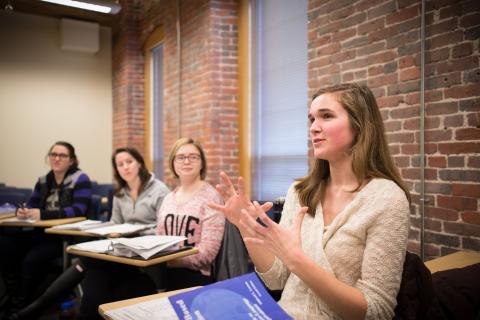Spotlight on ASL/English Interpreting

American Sign Language (ASL) interpreters play an important role in the Deaf and hard of hearing community, translating spoken English into ASL to ensure equal access to information and experiences. With increasing recognition of the critical importance of inclusivity and accessibility, the demand for ASL interpreters is on the rise.
“Interpreters are definitely in need, especially in the medical and legal fields as well as specialized interpreting settings,” Jotham Otterson, instructor of ASL at UNH Manchester and Pinkerton Academy, signed via an interpreter.
According to the Bureau of Labor Statistics, employment of interpreters and translators is projected to grow 20 percent from 2021 to 2031, which is 15 percent higher than the average growth rate for all occupations. Job opportunities in the field are expected to increase significantly, and Otterson says certified interpreters are particularly vital.
“Certified interpreters are especially important for language providing as the certification means that those interpreters are trustworthy and qualified,” he says.
The ASL/English interpreting program at UNH Manchester was the nation’s first accredited interpreting bachelor’s degree program and is one of only 15 in the country. The program integrates students with the Deaf community inside and outside the classroom, developing the background and experience in Deaf culture, ASL, interpreting and ethics to become a successful interpreter.
“I started learning ASL in high school, and I just fell in love with the language, the culture and the community,” says Emma Groenewal ’23. “The ASL/interpreting program at UNH Manchester is one of the best in the nation, and it’s given me incredible opportunities to interact with New Hampshire’s Deaf community.”
Led by instructors who are native ASL speakers as well as experienced interpreting practitioners, students get a holistic learning experience of the language, culture and interpreting process. It may not be easy, Otterson says, but it’s very important.
“Students in this program are really part of two different worlds where they are becoming language providers for the Deaf and hard-of-hearing community as well as the hearing world,” Otterson says. “Students learn a whole different culture and language, and it’s important for students to know that, while it may be challenging, we are all human. Just focus on learning and being involved.”
Being an ASL interpreter can be incredibly fulfilling and impactful work, and Groenewal looks forward to making an impact.
“New Hampshire has amazing ASL Interpreters, both hearing and Deaf, but the reality of being a small state is that we don’t have enough,” she says. “After these amazing Deaf teachers and community members so graciously allowed me to into their spaces and taught me about their culture, I’m excited to give back to this community.”